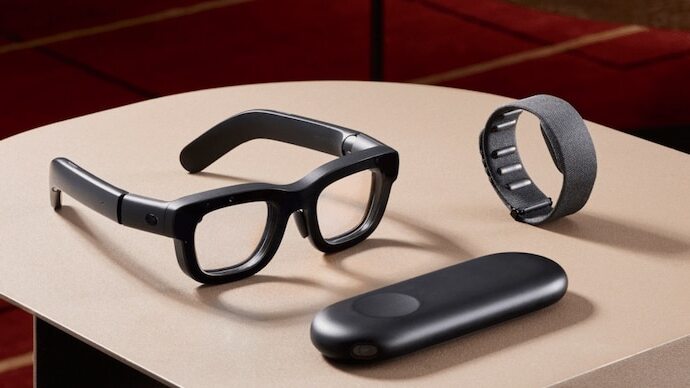Meta Platforms (NASDAQ:META), the parent company of Facebook, revealed its first augmented reality (AR) glasses prototype, "Orion," during its annual Connect conference Wednesday. CEO Mark Zuckerberg introduced the device, aiming to bring the virtual world into daily life through AR technology. This had also been tackled by The Verge in this article.
Photo by Bram Van Oost on Unsplash
“This is the physical world with holograms overlaid on it,” Zuckerberg said, presenting the sleek, black glasses pulled from a metal case on stage. “For now, the right way to look at Orion is as a time machine,” he added, describing it as a glimpse into a future with new ways of interacting with the world.
Alongside Orion, Meta showcased AI chatbot capabilities across its platforms and introduced a new mixed-reality headset, the Quest 3S, according to CNET. Following the announcements, Meta shares closed at a record high, rising 0.9% to $568.31.
Orion: A Vision for the Future of AR
Project Aria | Image courtesy Meta
Orion is built with a magnesium alloy frame and custom silicon developed by Meta, offering interactions through hand-tracking, voice, and wrist-based neural interfaces. While this first prototype appears chunky, Zuckerberg emphasized plans to develop a smaller, more affordable version before its consumer release.
Meta's aspirations for AR glasses align with its vision for the “metaverse,” a focus since 2021. Despite this ambition, developing practical AR devices has proven challenging due to technological complexities and high costs. Competitors like Google (NASDAQ:GOOGL) have faced setbacks, such as the failure of Google Glass.
Meta intends to make Orion’s technology mass-market by 2027, expecting significant technical breakthroughs to lower production costs, according to sources.
AI-Powered Enhancements and Chatbots
Credit: CNET
The tech giant also announced enhancements to its AI chatbot, Meta AI. The chatbot will now respond to voice commands and can mimic the voices of celebrities, including Judi Dench and John Cena. Zuckerberg believes voice interaction will become more natural than text-based communication for AI users.
More than 400 million people engage with Meta AI monthly, with 185 million returning weekly, the company reported. Additionally, Meta will introduce personalized images created by the AI chatbot into Facebook and Instagram feeds.
Quest 3S Headset and AI Enhancements to Ray-Ban Glasses
Meta revealed its latest mixed-reality headset, the Quest 3S, starting at $300, while also reducing the price of the Quest 3. The company plans further updates to its Ray-Ban smart glasses, which have gained popularity following the addition of AI features. The glasses will soon support new features like video generation and real-time translation between English, French, Italian, and Spanish.
Investments and Financial Outlook
Credit: META
Meta's investments in AI, AR, and metaverse technologies are substantial, with forecasts indicating capital expenditures between $37 billion and $40 billion in 2024, in which Wall Street Journal explains the relevance well. Reality Labs, Meta’s metaverse division, incurred an $8.3 billion loss in the first half of 2024, following a $16 billion loss in 2023.
While Meta continues to expand its product offerings, analysts suggest the company faces challenges convincing users of the benefits of its AI and AR innovations. However, Zuckerberg remains optimistic about the potential of these technologies to reshape consumer experiences.



 Thailand Inflation Remains Negative for 10th Straight Month in January
Thailand Inflation Remains Negative for 10th Straight Month in January  South Korea’s Weak Won Struggles as Retail Investors Pour Money Into U.S. Stocks
South Korea’s Weak Won Struggles as Retail Investors Pour Money Into U.S. Stocks  Trump Signs Executive Order Threatening 25% Tariffs on Countries Trading With Iran
Trump Signs Executive Order Threatening 25% Tariffs on Countries Trading With Iran  Vietnam’s Trade Surplus With US Jumps as Exports Surge and China Imports Hit Record
Vietnam’s Trade Surplus With US Jumps as Exports Surge and China Imports Hit Record  Trump Endorses Japan’s Sanae Takaichi Ahead of Crucial Election Amid Market and China Tensions
Trump Endorses Japan’s Sanae Takaichi Ahead of Crucial Election Amid Market and China Tensions  Dollar Steadies Ahead of ECB and BoE Decisions as Markets Turn Risk-Off
Dollar Steadies Ahead of ECB and BoE Decisions as Markets Turn Risk-Off  U.S.-India Trade Framework Signals Major Shift in Tariffs, Energy, and Supply Chains
U.S.-India Trade Framework Signals Major Shift in Tariffs, Energy, and Supply Chains  Dow Hits 50,000 as U.S. Stocks Stage Strong Rebound Amid AI Volatility
Dow Hits 50,000 as U.S. Stocks Stage Strong Rebound Amid AI Volatility  Trump Lifts 25% Tariff on Indian Goods in Strategic U.S.–India Trade and Energy Deal
Trump Lifts 25% Tariff on Indian Goods in Strategic U.S.–India Trade and Energy Deal  Japanese Pharmaceutical Stocks Slide as TrumpRx.gov Launch Sparks Market Concerns
Japanese Pharmaceutical Stocks Slide as TrumpRx.gov Launch Sparks Market Concerns  Oil Prices Slide on US-Iran Talks, Dollar Strength and Profit-Taking Pressure
Oil Prices Slide on US-Iran Talks, Dollar Strength and Profit-Taking Pressure  Japan Economy Poised for Q4 2025 Growth as Investment and Consumption Hold Firm
Japan Economy Poised for Q4 2025 Growth as Investment and Consumption Hold Firm  China Extends Gold Buying Streak as Reserves Surge Despite Volatile Prices
China Extends Gold Buying Streak as Reserves Surge Despite Volatile Prices  Gold and Silver Prices Slide as Dollar Strength and Easing Tensions Weigh on Metals
Gold and Silver Prices Slide as Dollar Strength and Easing Tensions Weigh on Metals  Bank of Japan Signals Readiness for Near-Term Rate Hike as Inflation Nears Target
Bank of Japan Signals Readiness for Near-Term Rate Hike as Inflation Nears Target  U.S. Stock Futures Edge Higher as Tech Rout Deepens on AI Concerns and Earnings
U.S. Stock Futures Edge Higher as Tech Rout Deepens on AI Concerns and Earnings 

























